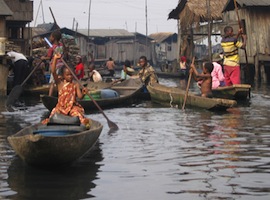Economic Empowerment
Source: IPS
In an open space near her home in Makoko, a crowded suburb of the sprawling city of Lagos, Latifat Agboola sits in the midst of bags of charcoal, attending to her customers. Some of them call her "the charcoal woman with the dirty job, but she sees herself as a businesswoman on the rise.
Less than a year ago, 35-year-old Agboola was minding shop for someone else, but she set up a business of her own last September, after she got a 20,000 naira ($130) loan from the Gumi cooperative society in her neighbourhood.
"It was a bad start because very little money was left for the actual business after I used the bulk of the money to register as a member of the charcoal sellers' association," she told IPS. "I was only able to buy one bag of charcoal at a time and I resold it in little packs."
Agboola made progress all the same and by January she had repaid the loan, and she was qualified for another 200 dollar (30,000 naira) loan. "This second loan provided the additional funds needed to improve the business as it enabled me to buy charcoal in much larger quantity, so my profit went up," she says.
Her profit from charcoal sales in a good week can go as high as 60 dollars (9,000 naira), equivalent to her monthly salary as a shop attendant. "With a better income, I no longer have to beg people for money, now I can buy what I want to buy, I can eat what I want to eat at anytime, but as a shop attendant, I had to wait until the end of the month before I could spend money."
Mutual assistance
Agoola got the money from a local savings and loan cooperative. The Gumi cooperative pools money from its members to make loans on which it charges as little as 15 percent interest.
"The group is made up of small women who are into small-scale business, says Tosun Jimoh, head of the group. "We deal mainly in small loans of between 20,000 naira and 40,000 naira ($270) and members can pay within six months. Members don’t require require any collateral, so long as they can get a guarantor we can trust."
Gender analyst Emem Okon, says Agboola's rapid progress is exactly the kind of transformation microcredit can enable in the lives of poor women like Agboola.
"Where microcredit is properly managed, it helps to improve the income of poor women, whether they are involved in petty trading or farming it provides the money to acquire the much needed inputs," says Okon, who is the head of the Kebetkache Women Development and Resource Centre, a non-governmental organisation based in southeastern city of Port Harcourt.
Agboola says her choice of what to invest the loan in was crucial to her success. "Charcoal business is a dirty job and that is why many people are reluctant to do it, but the secret is that it is a very lucrative business if you are determined."
It is the right business to get into in Makoko, with its high poverty and dense population. "With the high price of kerosene, many of the residents here are too poor to cook with [other kinds of] stoves, thus charcoal is a very cheap alternative for them," says Agboola. "There is a high demand for charcoal in this neighbourhood, but no one sells it. I am the only one currently selling it here."
Agboola is looking forward to taking out another loan which she hopes to use to rent a shop and buy charcoal in very large quantities, so she can operate as a distributor rather than a retailer. She dreams of a business that will eventually provide funds with which she will buy land and build a house.
Vital to the informal economy
"Microcredit schemes are important in Nigeria because it takes care of the needs of the vast majority of the poor populace who have no access to formal banking," former banker, Kwekwu Brown told IPS. "The poor end people who form the bulk of the population cannot meet strict bank requirements like collaterals and a history of a consistent cash flow so this informal system is the only option open for them when they need loan."
Nigeria's Central Bank recognises the important role microcredit plays in the country's informal economy, the practice having a history dating back centuries in some places.
Only 35 percent of the economically active population has access to the formal financial system, according to the Central Bank, while the remaining 65 percent "are often served by the informal financial sector like microfinance institutions, money lenders, and credit unions."
"Because of the limited opportunities they have, women form a large segment of the populace that has no access to the formal financial system," says Okon. She adds that from her experience there is the added burden that these women face numerous problems in accessing loans from the informal sector.
"We restricted Gumi's membership to women only so as to enhance their chances of getting small-scale loans," says Jimoh.
Agboola, a mother of two in a polygamous household, says she spends a substantial part of her income on her family. But Okon says diversion of funds to maintain the household can be a potential problem for many women who take microcredit loans.
"Culture is one of the problems. Women are sometimes denied microcredit loans out of the cultural belief that they are less likely to be successful in whatever business they do, so they are seen as a high risk group," Okon says.
The Central Bank says it has a policy to develop microfinance institutions in order "to cover the majority of the poor but economically active population by 2020 thereby creating millions of jobs and reducing poverty."

